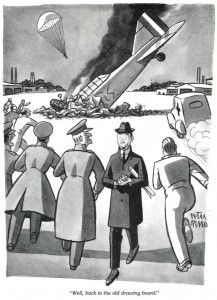The phrase ‘back to the drawing board’ came into popular usage in 1941 with a Peter Arno cartoon in the New Yorker showing engineers walking away from a plane crash as the passengers and crew exited by parachute. The concept reflects optimism, choosing to rethink plans rather than give up in the face of a setback.
This month’s contributors return to the drawing board in a variety of ways. Brothers Burt and Dick Rutan, pioneers in experimental aviation, literally went back to the schematics many times while designing and constructing the plane for the Voyager Aircraft initiative, which eventually circled the globe without refueling. As technology industry veteran W. David Schwaderer outlined in his May talk to volunteers at the Chabot Space and Science Center in Oakland, CA, reviewed by Cristina Deptula, the Rutan brothers ended up having to rework not only the Voyager’s physical design but also the project’s funding sources, time frame, and itinerary. The entire initiative always seemed to be in a constant state of flux, repair and adaptation until its final landing at the Edwards Air Force Base.
Poetry from Tony Longshanks LeTigre echoes the spirit of the Rutan brothers, as his speaker continues down a path after a marked dead end and then sets up an authentic life within a makeshift home. Shelby Stephenson reviews poet Lester Graves Lennon’s new book My Father was a Poet, inspired by Lennon’s discovery of his late father’s writing. Mr. Lennon’s father was also a man of perseverance, as he worked hard on his family’s farm in the rural American South, helped raise many children and ultimately lost his eyesight, yet found the time to create insightful words. Shelby Stephenson also reviews North Carolina Poet Laureate Ronald H. Bayes’ new collection Earthen Music, illustrating how Bayes celebrates the sound and beauty of the English language.
Joan Beebe reviews two novels from Larry Higdon, The Storms of Deliverance and The School from Hell, both with a theme of rebuilding. We see an addicted man put his life together while dealing with alcohol-induced amnesia, and a discouraged young schoolteacher in a poor country area find hope through getting to know a fourth grade student. Beebe also contributes original poetry, shining a light on German-Americans suffering the stigma of being wrongly associated with Hitler’s regime, celebrating the United States on its July 4th Independence Day, and evoking the wanderlust conveyed by the sight and sound of a train.
Ryan Hodge, in his monthly Play/Write column exploring the intersection of literature, life and video games, points out how several old-fashioned video games and science fiction and fantasy novels reveal that the dystopian governments may not be as powerful as they seem. The authorities invest in making examples of isolated rebels to show that they are in control when in fact they are vulnerable to overthrow by a large enough group of people. In order to win these games, and perhaps to make changes to real-life systems of power, we rebels need to evaluate the situation and rethink our approaches to the conflict.
In her monthly Book Periscope column, Elizabeth Hughes reviews Adam Sachs’ novel Three Yards and a Plate of Mullet, about a young boy so fascinated with sports that he turned his interest into a career as a reporter covering local high school football games in his Florida hometown. Three Yards is a novel of suspense and nostalgic glory, both for big game schools and the shared excitement of cheering for the home team and for old-fashioned journalism, in the 1980s still conducted inside newsrooms and published on stacks of inky newsprint, where even a new cub reporter could make a difference by investigating and uncovering a scandal. As the news industry struggles to adapt to new economic and technological realities, these paeans to days gone by will hopefully inspire a return to the newsroom’s drawing board rather than a surrender of the ideals of reportage.
Kahlil Crawford interviews Leland Ware, founder of the 48Blocks blog, which discusses new trends in skateboarding and hip hop music. Ware urges his readers to remember that skateboarding is an art, and to stay original and authentic with whatever art forms they pursue. To him, much mainstream hip hop lacks creativity and should be invigorated with fresh voices.
Finally, Christopher Bernard gives us a poetic dialogue between the human soul and brain as the two meet in an independent artsy coffeeshop, discussing the relative merits of technical inventions, logic and material progress over idealized thought, meaning, human connection and intuition. In this piece, inspired by Pope Francis’ recent comments on climate change and the environment, Bernard invites us to reconsider and embrace aspects of life and our psyches he feels have been neglected.
FYI we are hosting a reception Tuesday July 14th, 6-8 pm at Oakland’s Octopus Literary Salon, 2101 Webster Street near Lake Merritt. Lewis Mark Grimes, artist who creates unique ‘feather rishi’ Egyptian inspired patterns from peafowl feathers printed on silk scarves, will come up from Southern California for this event to show off his work. All others are invited to read, bring books to sell and share, or just enjoy food and drinks and conversation.
Here’s the Facebook event page: https://www.facebook.com/events/484597488362766/ RSVP appreciated but not required.
Also, our colleague in Portugal, poet and software developer Rui Carvalho, hosts a poetry contest on his blog and invites all writers to participate. Our magazine staff will provide editorial expertise to judge this competition and provide free writing coaching to the runners-up.
International Literary Contest: Poems and Tales for Nature 2015
Competition Adjudicator: Rui M. Carvalho
Prize-giving will be by the end of October 2015 using the web and the website where the results will be displayed.
For further details, rules & entry form visit http://talesforlove.blogs.sapo.pt

